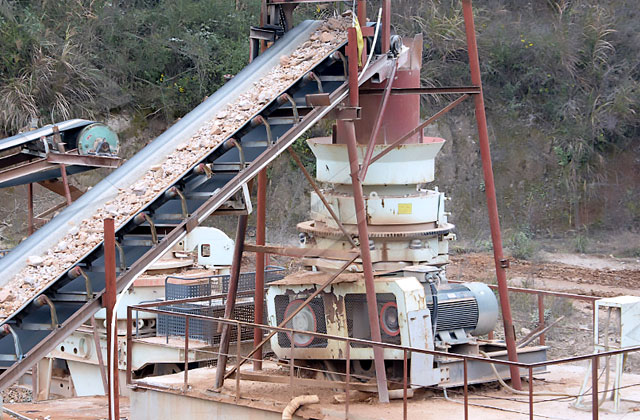Basalt is a common volcanic rock formed from the rapid cooling of lava. It has a fine-grained structure and is usually dark in color, ranging from black to gray. Basalt is widely used in construction and as a raw material for making concrete and asphalt. To process basalt efficiently, cone crushers play a crucial role in the production line. In this article, we will explore the process of basalt processing and the importance of cone crushers.
Basalt processing typically involves several stages, including crushing, grinding, screening, and shaping. Cone crushers are utilized in the first stage of basalt processing, which is the crushing stage. The raw basalt rocks are initially extracted from quarries or mines and then evenly fed into a jaw crusher for primary crushing.
The jaw crusher is responsible for reducing the size of the basalt rocks to a manageable size. It uses compressive force to break down the rocks into smaller pieces. Once the basalt rocks have been crushed to the desired size, they are then transferred to the cone crusher for secondary crushing.
Cone crushers are well-suited for secondary crushing applications. They have a cone-shaped crushing chamber that allows the rocks to be compressed between the mantle and concave. This compression helps in breaking down the basalt further into smaller fragments. Cone crushers are known for their high efficiency and excellent particle shape, making them ideal for producing high-quality aggregates.

During the secondary crushing stage, the cone crusher ensures that the basalt rocks are finely crushed to the required specifications. The crushed basalt material is then screened through vibrating screens to separate different sizes of aggregates. The screened material can be further processed or used directly depending on the specific application.
In addition to crushing, cone crushers can also be used for shaping the basalt material. By adjusting the crusher settings, such as the eccentricity and CSS (closed side setting), the cone crusher can produce different sizes and shapes of final products. This flexibility allows for customization of the end product, catering to the specific requirements of various construction projects.
Furthermore, cone crushers are equipped with advanced technologies that improve their performance and efficiency. Features such as hydraulic systems, automation, and adjustable settings contribute to the overall productivity and ease of operation. These technological advancements ensure that cone crushers can handle the demanding nature of basalt processing.
In conclusion, cone crushers play a vital role in the processing of basalt. They are used for primary and secondary crushing, as well as shaping the basalt material. Cone crushers offer high efficiency, excellent particle shape, and versatility in producing different sizes of aggregates. Their advanced features enhance their performance and make them suitable for processing basalt in various construction applications. By utilizing cone crushers in the basalt processing line, operators can achieve optimal results in terms of quality and productivity.
